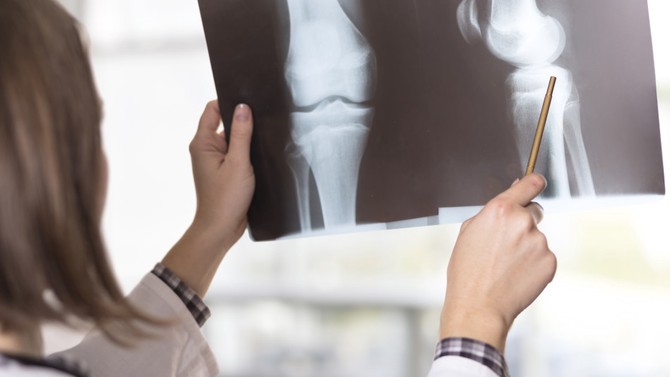Is This Why You Feel Bad? 6 Issues Tied to Inflammation
You know about gut issues and joint pain, but inflammation can affect your body in ways you'd never expect.
By Emma Haak

Photo: max-kegfire/istockphoto
More Than the Blues
The health issue: Depression
What inflammation has to do with it: Some experts believe that, in certain cases, inflammation can trigger depression and specific symptoms that go along with it. Jennifer Felger, PhD, an assistant professor of psychiatry and behavioral sciences at Emory University, is one such expert. She and her colleagues published a review this summer showing that inflammation may lead to low dopamine levels in the brain. Dopamine helps drive your brain's reward system, which explains why people with depression often lose interest in activities they used to enjoy, says Felger. Plus, at least two longitudinal studies (meaning, the researchers examined subjects over a number of years, not just at one point in time) showed that people with higher levels of inflammation but no depression at the beginning of the study were more likely to develop depressive symptoms later on. There's also some evidence that inflammation can make existing depression worse, "like throwing gasoline on a fire," as explained by the researchers behind a study in the American Journal of Psychiatry.
What you can do: Though this research is eye-opening, it's still evolving, so, "generally, psychiatrists aren't testing for inflammation and basing their depression recommendations around it yet," says Felger. That said, at some academic centers, including Emory's treatment-resistant depression program, experts are doing research on inflammation and depression to inform their treatment in the future. Her recommendations in the meantime: work with your doctor to find the best treatment plan for you, and try to manage your everyday stress and keep your weight at a healthy level, since both sky-high stress and extra pounds are known to increase inflammation.

Photo: champja/istockphoto
The Thing You Deal with Month After Month
The health issue: Premenstrual issues
What inflammation has to do with it: Women with higher levels of inflammation marker C-reactive protein (CRP) appear to get hit harder with certain premenstrual symptoms, according to a study in the Journal of Women's Health. Women with high CRP were 27 percent more likely to report moodiness, 40 percent more likely to deal with cramps and backaches, 41 percent more likely to experience weight gain and bloating and 26 percent more likely to report breast pain compared with women with lower CRP levels. It's not clear if inflammation comes first and causes these symptoms or the reverse, says lead study author Ellen Gold, PhD, a professor in the department of Public Health Sciences at the University of California Davis School of Medicine, but she's hopeful that future research will sort out this chicken-and-egg mystery.
What you can do: Gold notes that many women find anti-inflammatories like NSAIDs helpful in relieving symptoms. Beyond that, shedding excess weight and staying away from cigarettes may help too, as both can trigger inflammation.

Photo: vladans/istockphoto
Breaking Points in Your Body
The health issue: Brittle bones
What inflammation has to do with it: Those coping with inflammatory digestive disease, like Crohn's or ulcerative colitis, are probably not absorbing all of the nutrients they need to maintain strong bones. But even if you're not dealing with a gastrointestinal issue, high inflammation can damage bones in a more straightforward way, too, according to a review published in the Journal of Endocrinology. Inflammation speeds up the rate at which bone tissue gets broken down and released into your bloodstream and decreases the formation of new bone tissue, meaning bone material is getting taken away without being replaced.
What you can do: If you're dealing with an inflammatory disease and are worried about your bones, talk to your doctor about medications to treat both the underlying inflammation and the bone issue. Incorporating more weight-bearing exercises (think jumping moves and resistance training) can also help your bones become stronger.

Photo: PeopleImages/istockphoto
Flat-Out Exhaustion
The health issue: Chronic fatigue syndrome
What inflammation has to do with it: People suffering from chronic fatigue syndrome (CFS) have higher levels of inflammation in their blood, found a recent study in Microbiome. There was also evidence that some gut bacteria might have migrated into their bloodstreams, which could explain the inflammation, because their bodies may have been mounting an immune attack against the wayward bacteria, explains study author Maureen Hanson, PhD, a professor of molecular biology and genetics at Cornell University. On top of that, not only did subjects with CFS (now technically known as myalgic encephalomyelitis) have less diversity in their gut bacteria, they had more species known to be pro-inflammatory and fewer species that are known to decrease inflammation. This makes sense, says Hanson, because "a lot of the symptoms of the disease are inflammatory symptoms," like headaches, muscle aches and tiredness. "Most people feel like they have a never-ending case of the flu."
What you can do: Although this is another case where it's not clear whether the inflammation causes the disease or vice versa, Hanson notes that people could still benefit from treating their inflammatory symptoms. Ask your doctor about what they'd recommend.

Photo: PeopleImages/istockphoto
Serious Thinning On Top
The health problem: Hair loss
What inflammation has to do with it: There's an autoimmune disease called alopecia areata that leads to hair loss not only on your scalp but over your entire body. "Your body creates an inflammatory immune reaction that targets the cells that produce hair," explains Lindsey Criswell, MD, MPH, the chief of rheumatology at the University of California San Francisco Medical Center. "Hair loss can also be a symptom of lupus, another autoimmune disease."
What you can do: If you're dealing with major hair loss (not just regular thinning), ask your doctor if alopecia areata or another inflammatory condition could be the cause. Common treatments for hair loss include topical hair-growth stimulators, injected corticosteroids and, of course, anti-inflammatory medications.

Photo: AntonioGuillem/istockphoto
A Less-Than-Picture-Perfect Smile
The health issue: Receding gums
What inflammation has to do with it: Receding gums can be caused by periodontitis, or chronic inflammation of the gums. Interestingly, "there's some evidence that periodontitis might be the initial trigger for rheumatoid arthritis," says Criswell, another inflammatory disease that attacks the joints in your body (usually the smaller ones in your hands, wrists, feet and ankles).
What you can do: Good oral hygiene can help prevent periodontitis in the first place, and a study in the Journal of the American Dietetic Association suggests that eating omega 3 fatty acids may also help keep the inflammation at bay. You don't need to eat fish for breakfast, lunch and dinner, though: The researchers found that the benefits leveled off at a modest omega 3 intake, about the amount you'd get from eating 1.5 ounces of canned tuna per day. Worried you might already have periodontitis? Keep an eye out for bleeding gums, the first sign of the disease.
Published 10/05/2016

